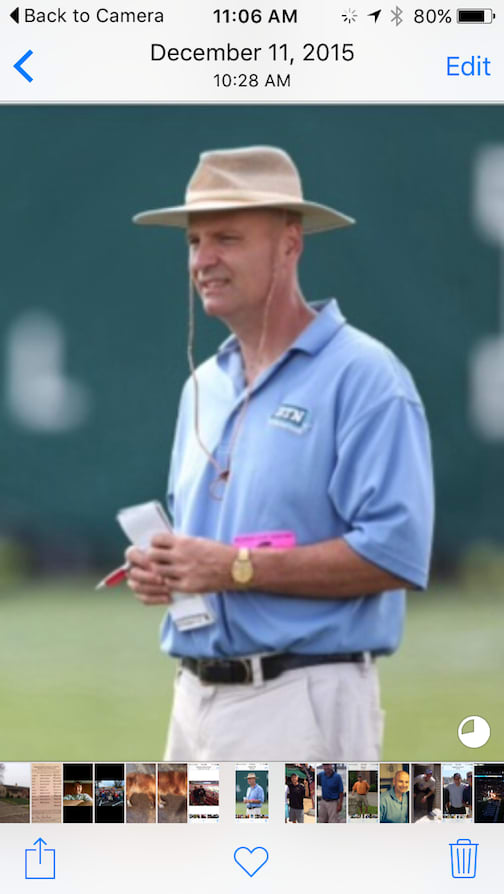
Houston Nutt laughs like only Houston Nutt can laugh.
"Can you believe it?" he said on Thursday. "They're gonna come back and reopen the 'Houston Nutt Rule.' "
Nutt laughs again.
Nutt saw his name pop up on various media channels in recent days when speculation grew that the NCAA was going to repeal a rule that capped signing classes at 25 players—plus up to seven more to replace portal attrition—annually.
The rule became official on Wednesday.
Now, a staff can sign as many players as needed each year to reach the 85-man limit, which had become difficult for some schools to reach due to portal attrition.
That signing day limit that was rescinded this week? It was put in place because of Nutt, who garnered nation-wide attention in 2009 when he inked 37 players as head coach at Ole Miss.
Thirty-seven.
"(The Ole Miss AD and chancellor) came down so hard on me," recalled Nutt. "Said I embarrassed them so much."
But Nutt had a method to his signing day madness back in 2009.
All 37 signees that February weren't going to make it to camp in August. Nutt knew that. And, he had a plan.
"The reason that number got so high is we had six or seven that were going to junior colleges, they were so far off with the ACT," said Nutt, who works as an analyst for CBS. "But they were going to be heavily recruited in two years, trust me. Heavily. And so, to me, it gave us a leg up (to recruit them later)."
Nutt was planting a seed, developing a relationship in hopes of swooping back in two years later and signing the player. Nutt also knew the players and their families appreciated it.
Said Nutt: "So, to motivate these young men, I said: "Listen, I know you're not going to be eligible. But I'm going to sign you because if you do work, maybe in two years, I'll come back and get you.' A lot of those kids felt like, 'Coach, you're the only one that signed me.' And so I wanted to really create relationships with the junior colleges.
"I knew how many I could sign. You think I'm gonna wait until August and say, 'Oh, by the way, you don't have a scholarship' ? No. Never did that. And so we calculated the numbers. But that one year, it got up to 37 and just all heck broke loose."
Back then, ESPN analyst/scout Tom Luginbill thought the recruiting move by Nutt was a stroke of genius. And still does today.
"That was brilliant," said Luginbill. "You look at the state of Mississippi, you've got 16 junior colleges in that state. And now you have yourself an opportunity to put together essentially a farm system. Thought it was a really, really good idea. And everybody freaked out, not because he signed 37, but because they didn't have that farm system in their state."
Ole Miss A.D. Pete Boone wasn't happy. He expressed his thoughts to the Memphis Commercial Appeal at SEC spring meetings in May 2009.
"I know all the academic requirements needed to enter our school, so I knew it would get down to the right number," said Boone. "We went through ones that wouldn't make it, he went through the ones he thought he would gray-shirt. He knew how they would all be placed, but I think it all got a little overdone."
At those same meetings, SEC presidents unanimously approved a rule limiting conference football teams to signing only 28 players annually. (NCAA rules permitted 25 per year back then, but SEC schools typically oversigned, knowing a portion of the classes wouldn't qualify academically.)
The Houston Nutt Rule was born.
"What I remember most about that class is that they went on a late run landing seven four-star players at the time in the final few days and weeks leading up to Signing Day," said On3.com's Jeremy Crabtree, a long-time recruiting analyst. "Again, normally coaches would drop kids, but Ole Miss was trying to revamp everything under Houston Nutt."
Said long-time recruiting analyst Mike Farrell: "I didn’t like the SEC limitation on scholarships back then, it didn’t bother me for teams to oversign. So now that it’s more flexible, I think it’s back to better.”
The late SEC commissioner Mike Slive said back in 2009: "The presidents and chancellors view the signing of a letter-of-intent as a commitment by a student-athlete capable of being academically admitted and can contribute athletically. Coaches have their own decisions for signing a player, but the chancellors believe this is an academic-educational decision when someone signs."
Luginbill knew what the fuss was about.
"(SEC coaches) were not going to allow that to happen because they didn't have the same advantage in their state (with JCs)," said Luginbill. "Now, I get it. I totally get it. Makes sense."
Nutt still laughs.
"I can't tell you how many stories I heard," said Nutt. "I get back in the office, it's like: 'Why would you embarrass us like that?'
"Embarrass what? That's when you don't have an AD in the foxhole with you, you know?"
Membership Info: Sign up for GoldandBlack.com now | Why join? | Questions?
Follow GoldandBlack.com: Twitter | Facebook | YouTube
More: Gold and Black Illustrated/Gold and Black Express | Subscribe to our podcast
Copyright, Boilers, Inc. 2022. All Rights Reserved. Reproducing or using editorial or graphical content, in whole or in part, without permission, is strictly prohibited.
